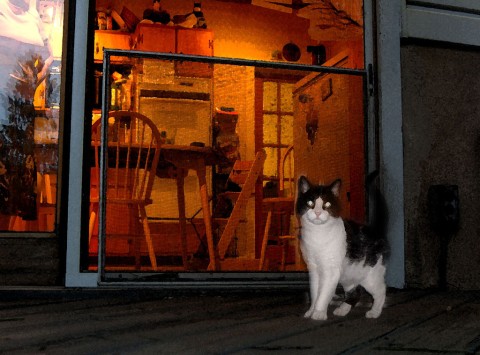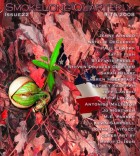The cat appeared on the back porch, the bird still alive in its mouth. A small, gray-feathered bird, its tiny beak gasping in silence, its legs drawn up. Jim was at the stove making dinner, sleeves rolled to his elbows. A late spring evening settled in outside, still full of daylight but blustery and promising rain. Jim could hear the wind in the trees through the screen door. In the other room, his sons—five and three years old—played with a toy that made revving, careening, and crashing sounds. Characters chattered on the TV. In the dining room off on the other side of the kitchen, Jim’s cell phone beeped. A message from his brother he’d been meaning to return. On the counter, cracked eggshells lay in a heap beside a mixing bowl. Jim had been whipping a mixture of eggs and milk into a froth when the cat hopped up onto the porch boards, the gasping bird in its teeth, eyes on Jim as if it had been thinking fondly of him when it brought the bird down. Such an expectant look on a cat’s usually indifferent face. The cat dropped the bird onto the porch, where it rolled over onto its back and flicked one broken wing. The cat sat up and gazed at Jim through the screen, certain of its prowess but only hopeful that he might take notice.
“God damn it,” Jim said, whipping the towel from his shoulder and moving toward the door.
Jim’s wife Anne walked into the kitchen. “Oh, no,” she said, spotting the bird. “Not another one. We need to put a bell on that cat.”
It had been a week of carnage. On one vigorous day, the cat had brought three different birds onto the porch within a period of several hours, the same hopeful expression on its face, all still alive but badly hurt and on their way out.
“Are you going to kill that bird?” Jim growled at the cat.
The cat blinked at him. It sat back, puffed up the crest of downy fur on its chest, and gazed down at its prize. It looked bored with the bird’s weak struggle to breathe.
“It’s still alive, Jim,” Anne said, almost in a whisper.
“I know. It’s broken—there’s no helping it now. We might as well let him finish it.”
The cat was cleaning one paw, its eyelids heavy and sated. The boys had seen most of the other birds; they had run into the kitchen each time with eager young faces to see what the cat had killed. The prey was always still dying just beyond the door, but closer to death than this one. Jim had explained that the cat wasn’t bad. This was all very natural. He told his wife there was no reason in trying to deceive the boys about that.
Jim crouched down to raise his voice at the cat. “Hey!” The cat sat up, ears flicking. “Kill that bird or get it off my porch. Or do both—help me out here. Can’t have one meal this week without a murder, can we?”
“That poor bird,” Anne said, holding herself, her elbows in her hands.
“How do you think anything ever got done in this world?” Jim asked her.
The bird jerked to life, both wings moving in disjointed directions. The cat, taking interest again, batted at the bird and knocked it into a shadow toward the corner of the porch.
Jim straightened and went back to the stove. Anne closed the door on the wind outside and went into the other room with the boys. Jim heard the TV shut off and, soon after, the sound of her reading to them from one of their dinosaur books. Pteranodon, allosaurus, tyrannosaurus. Velociraptor. He poured the bubbled mix of eggs and milk into the hot omelet pan and began unwrapping the cheese he would chop and crumble over the setting, fluffy layer. On the porch outside, the evening settled into dusk. Jim took a moment to see where the cat and bird had gone. He crouched again and squinted out through the glass. No sign of the cat. The bird lay on its side, back toward him, as a person might in bed. He couldn’t see in the shadow if it was still alive in the time before he turned away to check on the eggs.
#
In bed, hours later, Jim and Anne lay side by side, reading. Jim set his book down and gazed at the wall. “I should call my brother,” he said.
“It’s late. Call in the morning.”
“I should call my dad,” he said.
“Yes, you should. Tomorrow.”
“I should call my sister. Ask about the baby.”
Before setting his book down, Jim had found himself wondering if the bird could possibly still be alive on the porch. The cat had lost interest long ago. He imagined all the animals that roamed the neighborhood after dark—other cats, raccoons, opossums—and how one might come along and find this still-fresh kill on the porch, like a gift in the night. So fresh it was still breathing. He imagined that the bird was already dreaming of something removed from life, somehow already far from the fear and pain of death when the hungry eyes came out of the dark, full of any light they could catch from the neighbor’s yard or the moon, full of the sublime joy of absolute unflinching purpose.



 The core workshop of SmokeLong Fitness is all in writing, so you can take part from anywhere at anytime. We are excited about creating a supportive, consistent and structured environment for flash writers to work on their craft in a community. We are thrilled and proud to say that our workshop participants have won, placed, or been listed in every major flash competition. Community works.
The core workshop of SmokeLong Fitness is all in writing, so you can take part from anywhere at anytime. We are excited about creating a supportive, consistent and structured environment for flash writers to work on their craft in a community. We are thrilled and proud to say that our workshop participants have won, placed, or been listed in every major flash competition. Community works.